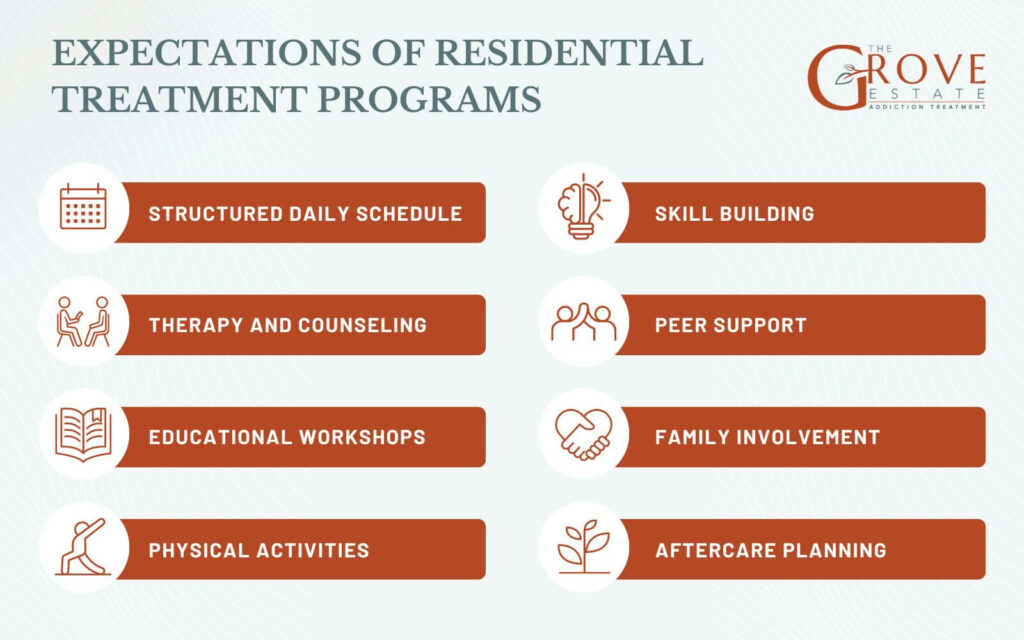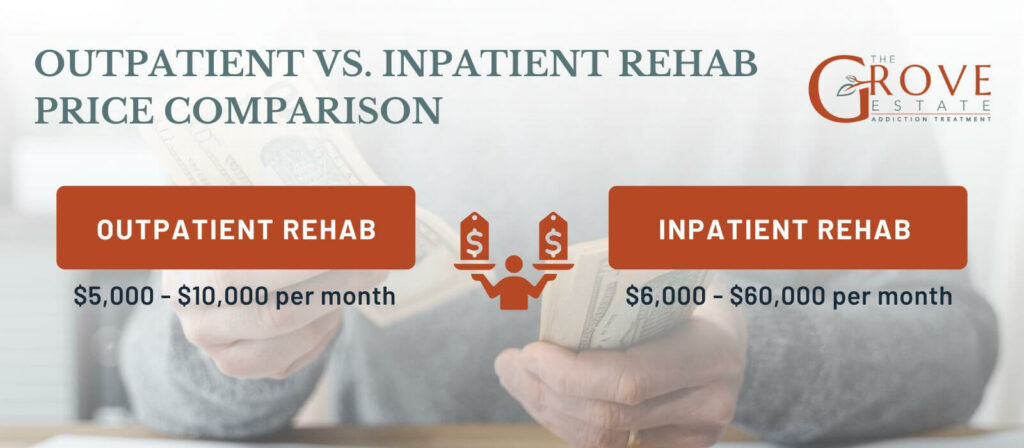Residential addiction treatment, also known as inpatient treatment, is a comprehensive approach designed for individuals who require a structured and intensive program to overcome substance use disorders. This treatment modality involves patients living at a treatment facility for a period, typically ranging from 30 days to several months, depending on the individual’s needs and the program’s structure.
These programs encompass all forms of treatment, from detox to behavioral therapy, in order to help individuals recover from drug and alcohol abuse. According to the Substance Abuse and Mental Health Services Administration (SAMHSA), approximately 2.5 million people in the U.S. sought treatment for substance use, with a notable number opting for residential treatment. This environment is conducive to recovery, providing a safe space away from daily triggers and stresses, allowing for comprehensive care and development of long-term recovery strategies.
What Is Residential Addiction Treatment?
Residential addiction treatment, also known as inpatient care, is an intensive therapy model designed for individuals struggling with severe substance use disorders. In this setting, patients reside within a specialized facility to access 24/7 comprehensive care. This environment is meticulously structured to immerse patients in their recovery journey, minimizing exposure to the daily stressors and triggers that may impede progress. The treatment centers offer not just lodging and balanced nutrition but also incorporate regular physical activities, therapeutic sessions, and medical oversight to help with holistic well-being.
Residential Treatment is particularly beneficial for individuals facing profound addiction challenges or those who have not found success in less rigorous treatment frameworks. The residential approach encompasses a thorough detox process, various therapeutic modalities, counseling, and peer support activities, all while receiving ongoing medical and psychiatric care, setting the stage for a comprehensive recovery pathway.
Who Needs Residential Treatment for Drug Addiction?
In determining the need for residential treatment for drug addiction, a personalized assessment is crucial. It involves evaluating the severity and duration of the individual’s substance use, their mental and physical health, the stability of their living situation, and their treatment history.
Candidates for residential treatment typically include:
- Individuals with severe or chronic substance use disorders.
- Those who have not benefited from less intensive treatment options like outpatient programs.
- People with co-occurring mental health conditions such as depression or anxiety.
- Individuals lacking a stable or supportive living environment.
- Persons who have experienced multiple relapses after undergoing other forms of treatment.

What are the Key Components of Residential Addiction Treatment?
Residential treatment programs often include support for co-occurring mental health disorders, life skills training, relapse prevention education, and aftercare planning to maintain long-term sobriety. The treatment process in residential addiction treatment typically involves several key components:
- Medically Supported Detox and Withdrawal: The first step in many residential treatment programs is a medically supervised detoxification process, where the body is cleared of substances under the close supervision of healthcare professionals. This phase helps manage withdrawal symptoms safely and comfortably, reducing the risk of relapse or other health complications.
- Comprehensive Therapy Options: Residential treatment provides a range of therapeutic modalities to address the psychological aspects of addiction. This includes individual therapy, where patients work one-on-one with a therapist, group therapy that builds mutual support among peers, and family therapy to address and improve family dynamics.
How Can Residential Treatment Centers Catalyze Long-Term Recovery?
Residential treatment centers facilitate long-term recovery by providing structured environments that remove individuals from their usual contexts of substance use. This controlled setting minimizes exposure to triggers and enables patients to focus solely on their recovery without external distractions or stressors. The predictability and routine of a structured environment also help establish healthy habits and coping mechanisms that are crucial for sustained sobriety.
Integrating behavioral therapies within these centers plays a pivotal role in long-term recovery. Therapies like Cognitive Behavioral Therapy (CBT), Dialectical Behavior Therapy (DBT), and motivational interviewing are used to help patients understand their addiction patterns, develop healthier thought processes, and learn effective coping strategies.
Additionally, residential centers offer support systems through group therapy, peer support groups, and family involvement, providing a network of support that can extend beyond the treatment duration. These components combined prepare individuals for life after treatment, reducing the risk of relapse and supporting a sustained recovery journey.
What To Expect From Residential Treatment Programs

A residential treatment program is structured and includes various scheduled activities and therapies. A typical day would include the following:
- Structured Daily Schedule: Includes wake-up, meals, therapy sessions, workshops, and free time.
- Therapy and Counseling: Group sessions, individual therapy, and specialty therapies like art or music therapy.
- Educational Workshops: Cover topics such as the nature of addiction, relapse prevention, and stress management.
- Physical Activities: Exercise sessions, yoga, or other fitness activities to promote physical health.
- Skill Building: Sessions on life skills, job training, or other activities to aid in post-treatment reintegration.
- Peer Support: Interaction with fellow residents to build a supportive community.
- Family Involvement: Family therapy sessions or visitations to repair and strengthen relationships.
- Aftercare Planning: Developing a plan for continued support and care after leaving the residential facility.
What are the Benefits of Choosing Residential Treatment?
Choosing residential treatment offers immersive care that is conducive to sustained recovery. This form of treatment provides an all-encompassing approach to addiction recovery, addressing both the physical and psychological aspects of addiction in a continuous, integrated manner. Here is a list of benefits in residential treatment:
- Immersive care conducive to sustained recovery
- All-encompassing approach addressing physical and psychological aspects
- Structured environment for focused recovery without distractions
- Strong support network and community
- Immediate support and understanding
- Building lasting relationships for long-term recovery
What is the Duration of Residential Treatment?
The duration of residential treatment programs can vary significantly, typically ranging from 30 days to several months, with some programs extending up to a year or more. The standard lengths are often categorized into short-term (30 days), medium-term (60 to 90 days), and long-term (90 days to a year or more).
Several factors influence the length of residential treatment, including:
- Severity and Duration of Addiction: Individuals with more severe or long-standing addictions may require longer treatment periods to effectively address their needs.
- Co-occurring Mental Health Disorders: Patients dealing with dual diagnoses, such as depression or anxiety alongside addiction, often need extended time in treatment to manage both conditions.
- Progress in Treatment: The pace at which a person progresses through the stages of recovery can affect treatment duration. Those who respond well to treatment may complete their program in a shorter time, while others may need additional time.
- Personal and Medical History: A history of previous treatments, relapses, or specific medical concerns can necessitate a longer stay in residential treatment.
- Insurance and Financial Resources: The length of stay can also be influenced by the coverage limits of insurance policies and the individual’s ability to finance treatment.
What is the Cost of Residential vs. Other Forms of Treatment?

Residential treatment tends to be more expensive than other forms of treatment due to the comprehensive care and 24-hour supervision provided. Costs can include expenses for medical detox, therapy sessions, room and board, meals, and other amenities. Prices vary widely depending on the facility’s location, program length, and the level of luxury. Inpatient rehab might cost between $6,000 and $20,000 for a 30-day program, with longer stays and luxury facilities costing significantly more, potentially upwards of $30,000 to $60,000 for the same duration.
Navigating insurance and financial assistance is critical in managing the costs of residential treatment. Many insurance plans cover at least a portion of addiction treatment, but coverage details can vary significantly. It’s important to verify the specifics of what your insurance policy covers, including the length of stay and types of services. Additionally, some treatment centers offer sliding scale fees based on income or financial assistance programs to help reduce the out-of-pocket expenses for patients. Researching and understanding these options can help make residential treatment more accessible and affordable.
How to Choose the Right Residential Treatment Center
When selecting a residential treatment center, consider the following criteria:
- Accreditation and Licensing: The facility would prominently display its accreditation from recognized bodies such as the Joint Commission or CARF (Commission on Accreditation of Rehabilitation Facilities). It would also hold all necessary licenses from state regulatory bodies, ensuring that it meets stringent standards for safety, care, and professionalism.
- Treatment Methods: The center would offer a comprehensive range of evidence-based practices, including cognitive-behavioral therapy, group therapy, medication-assisted treatment (if applicable), and holistic approaches like mindfulness or art therapy. Treatment plans would be customized to each individual’s needs, ensuring a personalized approach to recovery.
- Staff Qualifications: The staff would consist of highly qualified professionals, including board-certified psychiatrists, licensed therapists specializing in addiction treatment, nurses, and support personnel trained in dealing with addiction-related issues. The center would emphasize ongoing training and education for its staff to stay updated with the latest advancements in addiction treatment.
- Specialization: If the center specializes in treating specific types of addiction or co-occurring disorders (such as substance abuse and mental health issues), it would prominently advertise this specialization. This ensures that clients receive targeted and effective treatment for their particular challenges.
- Facility Environment: The facility would prioritize creating a safe, nurturing, and supportive environment conducive to healing and recovery. This includes comfortable living spaces, recreational areas for relaxation and exercise, nutritious meal options, and amenities that promote overall well-being.
- Aftercare Support: Recognizing the importance of ongoing support post-treatment, the center would have a robust aftercare program in place. This may include outpatient services, relapse prevention planning, support groups, family therapy sessions, and connections to community resources for continued support.
When evaluating residential treatment centers, consider asking the following questions:
- What specific types of addiction do you specialize in treating? An acclaimed treatment center would say: Our residential treatment center specializes in treating a range of addictions, including alcoholism, substance abuse (such as opioids, cocaine, and methamphetamine etc), and co-occurring disorders like depression and anxiety alongside addiction.
- Can you describe the range of therapy and treatment programs available? You want a treatment center that explains it this way: We offer a comprehensive range of therapy and treatment programs, including cognitive-behavioral therapy, individual counseling, group therapy, family therapy, medication-assisted treatment, holistic approaches like mindfulness and yoga, and life skills training.
- How do you tailor treatment plans to individual needs? A favorable response would be: We tailor treatment plans to individual needs through thorough assessments and personalized care plans. Our team collaborates with each client to understand their unique challenges, preferences, and goals, ensuring a customized approach to recovery.
- What are the costs, and how do you work with insurance and financial assistance? A good answer to this question would be: Our costs vary based on the level of care and services required. We work with various insurance providers and offer assistance in verifying coverage and maximizing benefits. Additionally, we provide financial assistance options and payment plans to help make treatment accessible.

How to Prepare for Residential Treatment?
Before entering residential treatment, it’s important to complete all necessary paperwork and arrange personal affairs, including work, family, and legal obligations, to ensure a smooth transition. A thorough medical and psychological evaluation should also be conducted to provide the treatment team with a detailed understanding of your health and addiction history.
When packing, include essentials like comfortable clothing, toiletries, identification, insurance information, and any prescribed medications. It may also be comforting to bring personal items, such as photos or a journal. Be aware of the center’s rules and avoid bringing prohibited items like drugs, alcohol, and non-prescribed medications. Prepare for a structured daily routine in the treatment center, which will include therapy sessions, group activities, and designated personal time, creating a balanced approach to recovery.
What Does Life Look Like After Residential Addiction Treatment?
After completing residential treatment, ongoing support and resources play a crucial role in maintaining sobriety and preventing relapse. Post-treatment support may include outpatient therapy, support groups, and sober living arrangements. These resources provide continued guidance, peer support, and accountability, which are vital for navigating the challenges of reintegration into everyday life.
The role of aftercare in maintaining sobriety is paramount. Aftercare plans often include regular counseling sessions, participation in community support groups like Alcoholics Anonymous (AA) or Narcotics Anonymous (NA), and sometimes continued medication management if necessary. This continuous engagement in recovery activities helps to reinforce the coping strategies and healthy habits developed during residential treatment, ensuring a stable and long-term recovery journey.
Are there specialized residential treatment programs that focus specifically on addiction recovery within certain age groups or professions?
Yes, there are residential treatment programs tailored to specific age groups, such as adolescents, young adults, or seniors, as well as professionals like healthcare workers, first responders, or executives. These specialized programs address unique challenges and factors related to age or profession while providing targeted addiction treatment and support.
How do residential treatment centers incorporate spirituality or faith-based approaches into addiction recovery programs?
Some residential treatment centers offer programs that integrate spirituality or faith-based principles into addiction recovery, including Christian-based, Buddhist, or holistic spiritual approaches. These programs may include spiritual counseling, meditation, prayer sessions, and activities focused on personal growth and connection to higher meaning or purpose.
Is residential treatment suitable for all types of addiction, including substance abuse and behavioral addictions?
Yes residential treatment can be effective for various types of addiction, including substance abuse (alcohol, drugs) and behavioral addictions (such as gambling or internet addiction). These programs offer a comprehensive approach to address underlying issues, develop coping skills, and support long-term recovery regardless of the type of addiction.
How can residential treatment programs prevent relapse?
Residential treatment programs are specifically designed to provide a deep level of care that addresses the root causes of addiction, equipping individuals with the tools needed to manage cravings and avoid relapse. These programs offer various therapies, such as cognitive-behavioral therapy (CBT), which helps patients develop coping mechanisms to handle triggers and stressful situations without resorting to substance use.
Moreover, the structured environment of a residential program minimizes exposure to triggers during treatment, which is crucial during the early stages of recovery. After completing a program, family integration continues to play a vital role, as ongoing support from loved ones can be critical in maintaining long-term sobriety. According to the American Psychological Association, the continuity of care and support networks is essential for successful long-term recovery and relapse prevention.
What types of therapies are offered in residential treatment programs?
Residential treatment programs offer a variety of therapies designed to address the psychological aspects of addiction. Common therapies include Cognitive Behavioral Therapy (CBT), which helps patients recognize and change harmful behaviors and thought patterns, and Dialectical Behavior Therapy (DBT), which is effective in teaching skills to manage emotions and decrease conflict in relationships. Additionally, many programs also provide family therapy, motivational interviewing, and trauma-informed care, depending on the individual’s needs.
These therapies are supported by structured routines that include physical activities, nutritional counseling, and peer support sessions, which together foster a holistic approach to recovery. For individuals requiring ongoing support after the intensive phase of residential treatment, outpatient addiction treatment services can continue to support recovery with less intensive but equally focused care options.

Share This Post



